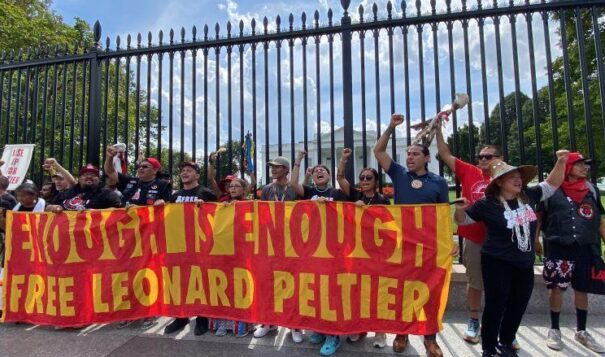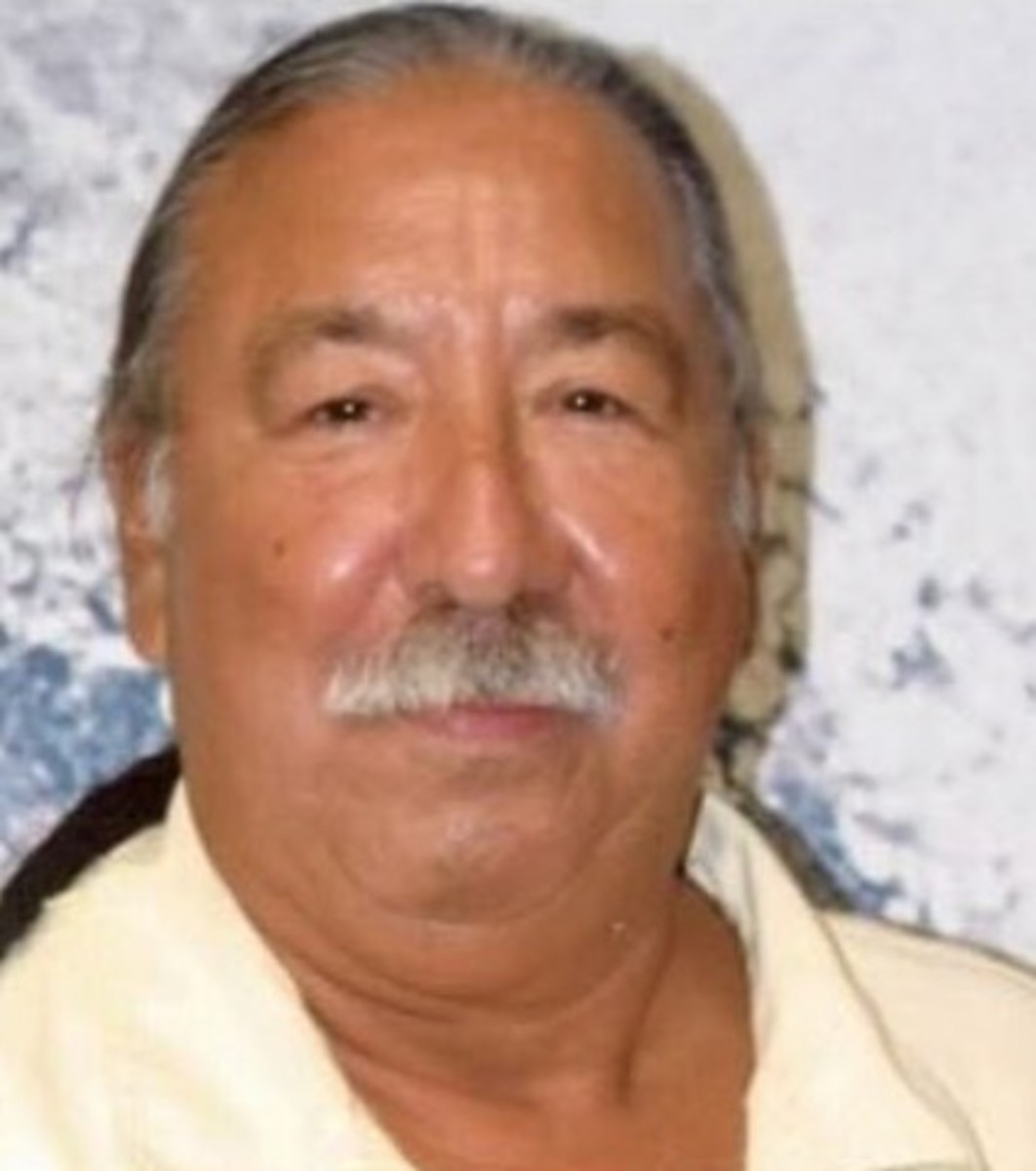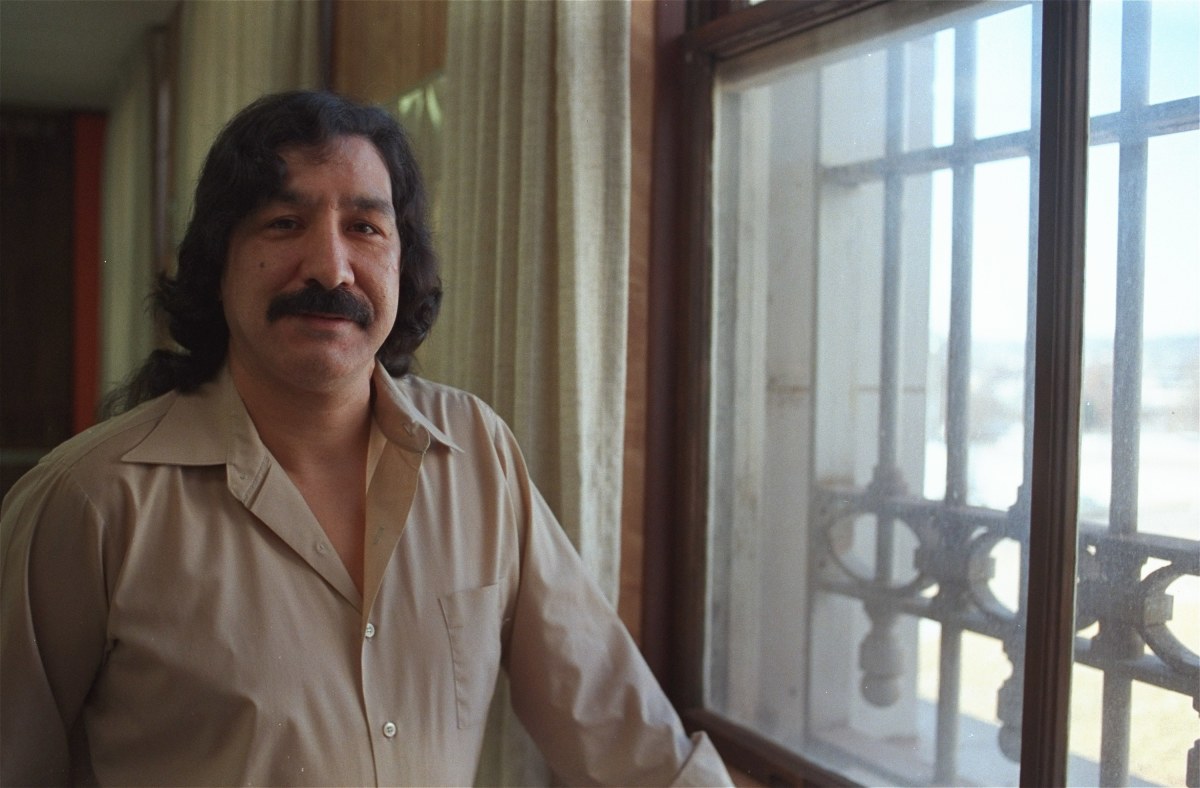News Based on facts, either observed and verified directly by the reporter, or reported and verified from knowledgeable sources.
Leonard Peltier: ‘I hope I make it to June 10’
 Hundreds of demonstrators took to the White House in Washington, D.C. for the Free Leonard Peltier 79th Birthday Action on September 12, 2023. (Jourdan Bennett-Begaye, ICT)
Hundreds of demonstrators took to the White House in Washington, D.C. for the Free Leonard Peltier 79th Birthday Action on September 12, 2023. (Jourdan Bennett-Begaye, ICT)
Advocates say June parole hearing may be Leonard Peltier’s last chance at freedom and they plan to push hard for his release
At 80 years old, Leonard Peltier is approaching what may be his last attempt at freedom.
On June 10, the Anishinaabe elder will participate in what may be his final parole hearing. Peltier is currently serving two consecutive life sentences after being convicted of killing two FBI agents in 1975 at the Jumping Bull Ranch in South Dakota.
Peltier is asking for the public to spread the word about his parole hearing, said Dawn Lawson, secretary of the Leonard Peltier Ad Hoc Committee.

“For a long time, people have been dying in that prison and the (Federal Bureau of Prisons) is out of control,” Lawson said. “They’re (U.S. Penitentiary Coleman 1) currently on indefinite lockdown, not because anybody has done anything, just because they can. They (prisoners) are living in their own filth. Leonard is making an appeal to his people to please get anybody’s attention.”
In the past few months, the Turtle Mountain Band of Chippewa citizen’s health has taken a turn for the worse, so much so that his attorneys say they’re concerned he won’t make it to the June parole hearing.
“He didn’t sound good when I spoke with him on the phone today (April 22), he doesn’t even know if he’s going to make it to next week,” said Nick Tilsen, Oglala Lakota and CEO of the NDN Collective. “He told me, ‘I hope I make it to June 10, and I hope I can make it 30 days after that.’”
Peltier has been struggling with health concerns for years. He’s had trouble managing his diabetes while incarcerated, experienced the loss of vision in one eye, had open heart surgery, an aortic aneurysm, and is dealing with the lingering effects of contracting COVID-19.
On April 16, the Leonard Peltier Ad Hoc Committee issued a press release and organized a calling campaign to urge federal prison officials to address Peltier’s health problems. Since then, Peltier’s lead attorney, Jenipher Jones, was able to arrange for a doctor outside the prison to meet with Peltier twice.
The medical visit revealed Peltier was experiencing eye damage and would need to see a specialist, but prison officials said it would take 8 to 10 months to coordinate such a visit.
In February, Judith LeBlanc, executive director of the Native Organizers Alliance, requested the U.S. Department of Justice approve the compassionate release of Peltier based on his health problems. Compassionate release is available for prisoners who seek early release due to extraordinary or compelling circumstances, according to the American Bar Association.
“At a time when democratic values are being challenged, DOJ should take action as he nears the end of his life and allow him to return to his family on his ancestral homeland,” LeBlanc said in a statement. “We implore the DOJ to grant Peltier’s compassionate release.”
Tilsen called on the Biden administration to take action.
“This administration, the Biden Administration, has said that Native American rights are a priority to them, and yet they’ve got the longest sitting Indigenous political prisoner locked up and we’ve seen no action from the federal government,” Tilsen said. “If he dies in prison this will forever be a part of that administration’s legacy as it relates to Native people.”
Tilsen said he’s been fighting for Peltier’s freedom since he was a small child. Now, his organization is on the front lines of Peltier’s fight.
“It’s all hands on deck,” Tilsen said. “With the right medical treatment Leonard could live for a while, but without it he’s almost guaranteed to not make it.”
With the announcement of Peltier’s parole date, NDN Collective is switching gears from putting its energy toward compassionate release for Peltier and instead educating the public on his push for parole.

A chance to tell his story
Within 30 days after the June 10 parole hearing, the parole commission will issue its decision. A recommendation will be delivered to the commission for a final decision to be made.
Since Peltier is a federal prisoner serving a sentence of 30 years or more, he is eligible for a parole hearing within 9 months of his eligibility date as determined by the Bureau of Prisons. This hearing may be his only shot.
“The parole hearing on June 10 is the most important parole hearing of Leonard’s life,” Tilsen said. “He won’t live long enough for another parole hearing to come around.”
The parole hearing will give Peltier and his defense committee a chance to tell his side of the story and express his thoughts as to why he should be paroled.
Details of the offense, prior criminal history and other details will influence the comission’s decision. Peltier’s accomplishments in the correctional facility, details of a release plan and any problems he’s had to meet in the past will all be presented.
“We want to make sure that the commissioners and the parole officer do feel the weight of this,” Tilsen said. “He’s dying in federal prison right now. They will be liable for his death. They’re perpetuating civil rights and human rights violations.”
If paroled, Peltier would plan to return to the Turtle Mountain Reservation, Lawson said. Peltier owns property in his community and if paroled would serve the remaining portion of his sentence there.
“This is going to be the deciding factor on whether he gets to go back to his homelands, to see his child, grandchildren, and his people,” Tilsen said.
Peltier’s prison sentence is part of a larger issue, Tilsen said, it’s a reflection of how Indigenous activists were punished for the AIM Movement of the 1970s.
One day in June
In the summer of 1973, the American Indian Movement attracted hundreds of Native people to Wounded Knee on the Pine Ridge Reservation. Oglala Lakota elders had called the AIM headquarters in Minneapolis to request help in dealing with their tribal council.
On June 26, 1975, two FBI Agents Ronald Arthur Williams and Jack Ross Coler, traveled to the Pine Ridge reservation in search of Jimmy Eagle, an Indigenous man who was wanted in connection with the theft of a pair of cowboy boots and the assault of two ranch hands.
Sometime after 11 a.m. the two agents, traveling in two different unmarked vehicles, began following a vehicle they believed was transporting Eagle. The agents trailed it to the Jumping Bull Ranch in Oglala, South Dakota, where a shootout between AIM members and the two FBI agents erupted.
By the time the shootout ended, Williams and Coler and 23-year-old Joseph Bedell Schultz, a citizen of the Couer d’Alene Tribe, lay dead.
After a five-week trial before an all-white jury in Fargo in March 1977, Peliter was convicted of murdering both agents. Two other AIM members, Darrelle “Dino” Butler and Bob Robideau, had previously been acquitted of charges of aiding and abetting in the death of the two FBI agents during a trial in Cedar Rapids, Iowa.
On April 18, 1977, Peltier was given two life sentences, which he’s been carrying out at USP Coleman 1, a maximum security prison in central Florida, for over a decade.

“The FBI waged an illegal war on the American Indian Movement and against the Indigenous peoples movement using taxpayer dollars,” Tilsen said. “There was a reign of terror on the Pine Ridge Indian Reservation.”
Former North Dakota state representative Ruth Buffalo has visited with Peltier several times and remained in contact with him, last speaking to him by phone earlier in April. She said she’s concerned about his health, though he remains in good spirits and even made her laugh during their phone conversation.
“He doesn’t want any of us to feel sad for him,” she said. “He hasn’t given up and he doesn’t want any of us to give up”
But Peltier also doesn’t want to die in prison, Buffalo said.
“It’s just time for him to be out to be a free man in his country and to live the last days of his life with his family,” she said.
Dateline:
RAPID CITY, S.D.
